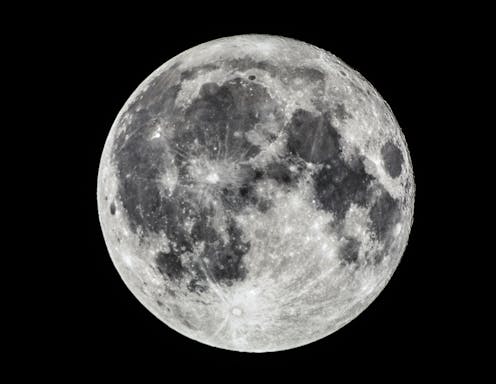How can there be ice on the Moon?
- Written by Thomas Orlando, Professor of Chemistry and Biochemistry, Georgia Institute of Technology

Comets and volcanoes
How did the Moon get its water? No one is certain yet, but there are some theories.
Eons ago, comets – which are basically frozen, dirty snowballs – crashed into Earth, leaving their comet water. That’s one of the ways Earth developed its oceans[21]; perhaps that’s how the Moon got some of its water too.
Other scientists think ancient volcanoes on the Moon released water vapor[22] when they erupted billions of years ago. Eventually, that vapor descended to the surface as frost. Over time, layers of that frost accumulated, particularly at the poles; much of it may have found its way inside lunar craters as ice.
Drinking water for astronauts
Water is heavy. Transporting it to the Moon by spacecraft would be costly. So it makes more sense for astronauts to figure out a way to use the water already on the Moon[23].
But Moon water is not drinkable as is; it would have small pieces of the lunar soil and possibly other molecules mixed with it. Astronauts living in Moon colonies would need to purify any water they collected. This is a tricky process that would require considerable effort and resources[24].
There is a plan to drill for the water and look for it, the way people hunted for underground gold during the 19th century gold rush[25]. The analogy is not a bad one – water on the Moon might eventually be more valuable than gold on Earth.
And not just for drinking. Water, of course, is two parts hydrogen, one part oxygen; it can be split. This is a win-win: Astronauts can use the hydrogen for rocket fuel and the oxygen for breathable air. Using the Sun as a power source, the water splitting is probably doable[26].
Returning to the Moon and establishing a permanent base are enormous commitments[27] requiring decades of work, billions of dollars, the cooperation of many nations, and many new technologies[28] yet to be developed. But as the world enters this dramatic new chapter of space exploration, pioneers run the risk of destroying or polluting a unique environment[29] that has been in existence for billions of years – and many scientists feel a deep obligation[30] not to repeat the painful lesson we’re now learning here on Earth.
Hello, curious kids! Do you have a question you’d like an expert to answer? Ask an adult to send your question to CuriousKidsUS@theconversation.com[31]. Please tell us your name, age and the city where you live.
And since curiosity has no age limit – adults, let us know what you’re wondering, too. We won’t be able to answer every question, but we will do our best.
References
- ^ Curious Kids (theconversation.com)
- ^ curiouskidsus@theconversation.com (theconversation.com)
- ^ is covered in water (www.usgs.gov)
- ^ within the Goldilocks zone (science.nasa.gov)
- ^ huge magnet in the center of the Earth (science.nasa.gov)
- ^ harmful radiation, mostly solar wind and cosmic rays (science.nasa.gov)
- ^ hardly looks like a water world (science.nasa.gov)
- ^ worn-out internal magnet (science.nasa.gov)
- ^ atmosphere so weak (www.nhm.ac.uk)
- ^ as scientists (chemistry.gatech.edu)
- ^ who study space (landslides-geohazards.gatech.edu)
- ^ work to develop technologies (www.gatech.edu)
- ^ thought Moon water was unlikely (science.nasa.gov)
- ^ Apollo astronauts (www.nasa.gov)
- ^ Lunar Crater Observation and Sensing Satellite, or LCROSS (science.nasa.gov)
- ^ water ice was ejected (www.nytimes.com)
- ^ evaporate (www.britannica.com)
- ^ sublimate (www.britannica.com)
- ^ SOFIA, the Stratospheric Observatory for Infrared Astronomy (www.nasa.gov)
- ^ Marcos Silva/iStock via Getty Images Plus (www.gettyimages.com)
- ^ developed its oceans (www.jpl.nasa.gov)
- ^ ancient volcanoes on the Moon released water vapor (www.colorado.edu)
- ^ use the water already on the Moon (www.nasa.gov)
- ^ considerable effort and resources (www.nasa.gov)
- ^ 19th century gold rush (www.history.com)
- ^ water splitting is probably doable (www.sciencedirect.com)
- ^ establishing a permanent base are enormous commitments (finance.yahoo.com)
- ^ and many new technologies (www.gatech.edu)
- ^ destroying or polluting a unique environment (www.salon.com)
- ^ feel a deep obligation (astrobiology.nasa.gov)
- ^ CuriousKidsUS@theconversation.com (theconversation.com)
Authors: Thomas Orlando, Professor of Chemistry and Biochemistry, Georgia Institute of Technology
Read more https://theconversation.com/how-can-there-be-ice-on-the-moon-225979

